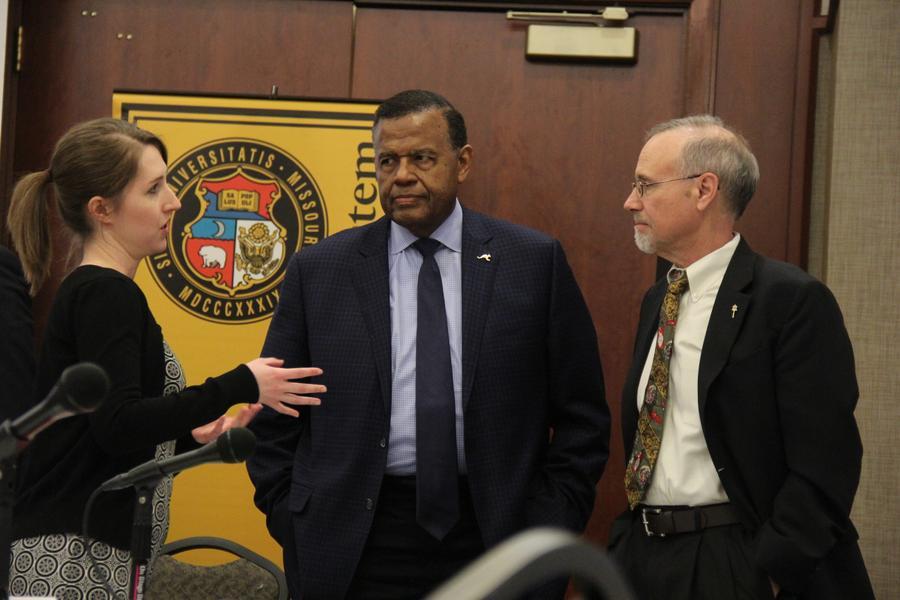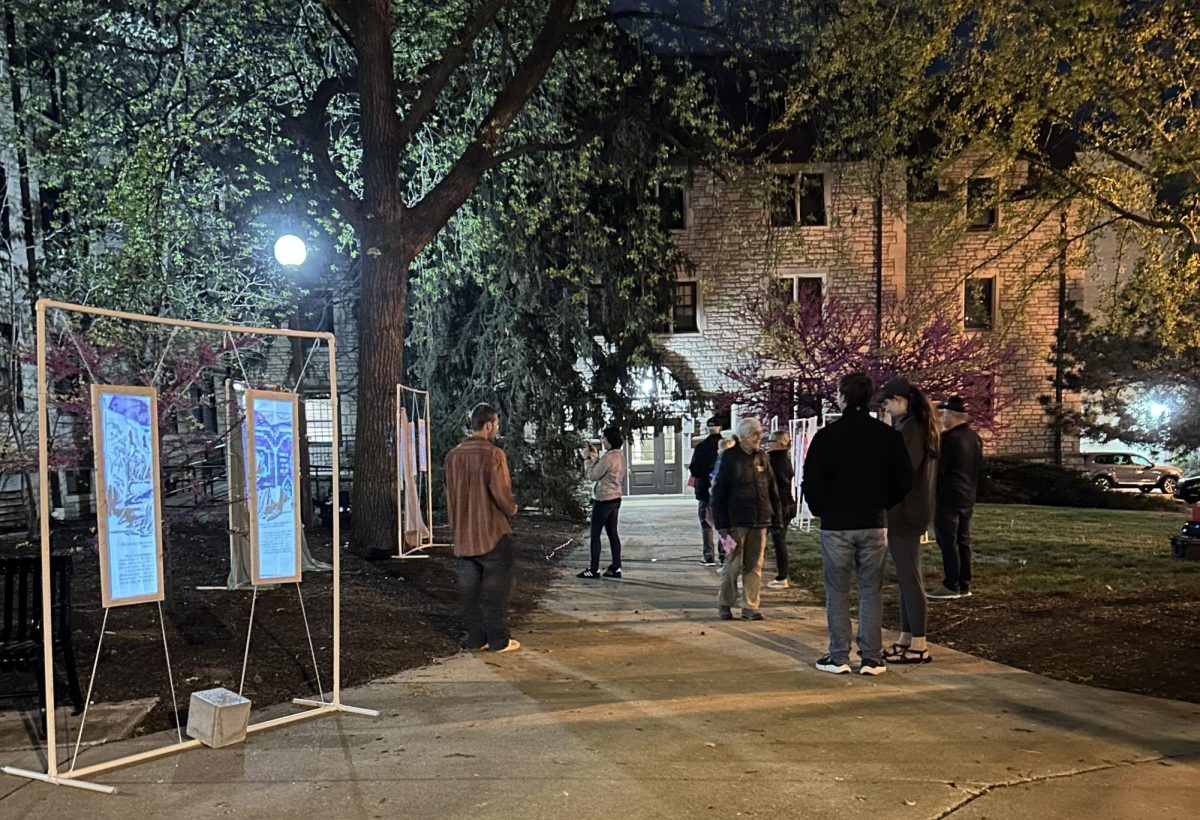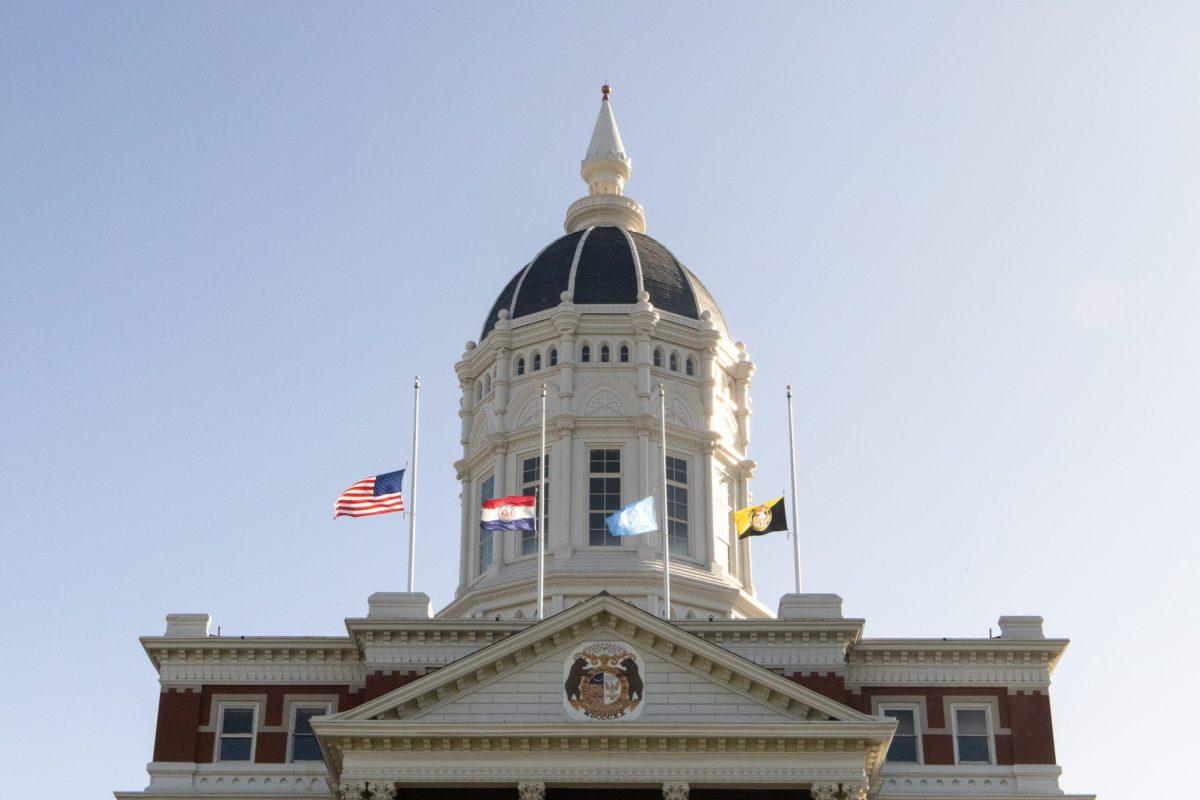From resignations to substantial changes, Tracy Mulderig has seen a lot in the past two years as the UM System Board of Curators’ student representative. From February 2014 to February 2016, she was the voice of the UM System’s 77,000 students and had access to the curators’ inside information and executive sessions. Mulderig, a doctoral student at UM-St. Louis, discussed her time in the position with The Maneater.
**How did your experience as the representative match up to your expectations?**
I think it’s safe to say that it far surpassed any of my wildest dreams. Reflecting on last fall, things happened that I never would have imagined when I applied for the position in the fall of 2013. Overall, I had numerous opportunities to have an impact and ensure that the student voice was heard throughout the entire two years.
It was rewarding, but I think a two-year term is the ideal length for a student representative to the board. While I could relay student concerns and relate to the student perspective, it became increasingly difficult for me to be objective. The student representative is both a student and a board member. After spending a lot of time with other board members, there’s a point toward the end where you may think more like a board member than a student. That’s one of the beauties of board members cycling in and out every two years. You’re constantly being pushed by new perspectives and people who were not around when certain events occurred. You can challenge your thinking and things that you might take for granted because everyone else experienced it from the same perspective.
**What was it like being on the board during everything that happened last fall?**
It was challenging. There were a number of extra meetings. Thankfully, my dissertation advisor and my boss at work were both supportive of me fulfilling my role to the best of my ability. The student representative is the voice of all students in the system. I worked hard to stay engaged with what was happening at MU, while also trying to reassure the other campuses that I was focused on how decisions might affect their campuses as well.
It was an isolating experience. For better or for worse, the student representative is likely to have a more complete or different set of information about events that unfold in the system. Because of this and because executive session topics must remain confidential, you can feel isolated at times. It’s important to have people in your corner you can lean on even if you cannot confide in them. We all need a support system, especially students in leadership positions.
I think it will be great for the next student representative because he/she will have an opportunity to impact the rebuilding process. The events of the fall happened at the end of my term. I continued to be engaged, but it was difficult knowing that I wouldn’t be around to help rebuild. That was personally challenging for me, to continue fighting and engaging when I knew it would be time to pass the baton in a month or two.
**During executive session, there are things that only you and the curators knew. Was it hard to not be able to tell friends, family or anyone else this information?**
Absolutely. I think that is probably one of the biggest burdens that comes with the position. Any one small thing is fine, but it gets to be cumulative. It certainly was a great challenge. We would use each other as sounding boards, but there are times when you just really want to talk something through with someone who has a fresh perspective. But it’s so important to protect the confidentiality of executive session, because your decision-making ability is compromised if you’re racing against the clock. That’s difficult, but I found that individual curators were incredibly encouraging and supportive of me personally. People would always accept my call if I needed to talk something through.
**Did you ever feel left out of conversations among the curators?**
Yes, but I think it was an accident. The nature of the role involves a lot of one-on-one phone calls, which can make it difficult to stay up to speed. There were times when I felt like I was the last person to know things, but I never felt that it was intentional. In hindsight, it was never detrimental. I think it might be different if the student had a vote, but who knows.
**How do you think the role would be different if the student were able to vote?**
I don’t think it would be different in terms of student engagement. As the student representative, you know you’re the only student at the table. You’re eager to pay attention and ask questions to make sure that the student perspective is heard when it needs to be.
Having a vote might have changed my approach with getting things done. Currently, the student representative has a lot of ability to influence decision-making, but it’s entirely based on the power of persuasion. Persuasion is still important if you have a vote, but your final opinion does not go on record for action items. I suppose that the student representative could proactively use time at the end of open discussions to say “I would vote yes/no on this”, but that was not my style. There were a number of times when I would have liked to go on record by voting on an action item. There were also times when not having a vote was preferable. If I had a vote, I might have abstained from these items. At the end of the day when board meetings concluded, I had to return to my campus and make progress toward my degree. While it would be unfair, there is a risk that a voting student representative could face backlash from faculty or administrators during difficult times if the board takes actions that upset individuals who have power over a student’s degree progress.
**Moving forward, do you think there’s hope for the UM System’s relationship with the Missouri legislature?**
I’m very optimistic. I know that a number of people are working very hard to repair these relationships. Members of the General Assembly only have so many resources to give out, and there’s always going to be conflict over how these funds should be allocated. I will always say that an investment in education is a solid investment. I believe it’s important for individuals to reach out to their elected officials to help communicate the importance of funding higher education. We can all do our part. It’s not only the responsibility of leaders at the university. Citizens of the state can also help repair the relationship by communicating how the university has impacted their lives for the better.
**How has your perception of the UM System changed after your time in the position?**
I learned so much about the university and the financial responsibilities that come along with steering such a large organization. For example, I learned about extension and MU Healthcare. I think I grew to have more compassion for people who work at the system level, because I think there are perceptions on individual campuses that the system is too big or that the system is interfering with campus operations. Coming from that and then getting to know people in the system personally, I think I have a more balanced perspective now. I deeply respect Interim President (Mike) Middleton. I had a good working relationship with President (Tim) Wolfe. Prior to taking the position, I had many misunderstandings about the roles and responsibilities of the president.
**Do you plan to be involved in anything related to the UM System in the future, such as lobbying?**
Absolutely. I think I need a little bit of a break to recharge and try to focus on school because it’s been difficult to ramp back up. I’m a believer in quality affordable public higher education. I think it’s a very important investment that our state should absolutely make. Anything that weakens public higher education has dramatic consequences on people’s lives in so many ways. I don’t know that I’m the right person to visit Jefferson City, but I’d like to continue serving, giving back and playing my part, because I think all alumni have the responsibility to do their part.













